|
|
|
Sort Order |
|
|
|
Items / Page
|
|
|
|
|
|
|
| Srl | Item |
| 1 |
ID:
183085
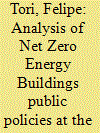

|
|
|
|
|
| Summary/Abstract |
The building sector could have a high impact on the reduction of GHG emissions. Several countries have developed public policies to encourage Net Zero Energy Buildings (NZEB) as one of the main approaches to reach their GHG reduction goals. Chile has adopted different goals and action plans to reduce fossil fuels and GHG emissions. However, there is a lack of public policies for the building sector. Chile should consider the NZEB an effective measure to reduce GHG emissions because this policy has been successful in other countries, regions, or states because NZEB reduce energy consumption in the building sector and produce energy from renewable sources. This research aims to identify, analyze and compare mandatory public policies of different countries towards NZEB. Different countries' public policies are identified and classified through a literature review based on keywords. Chilean public policies are compared concerning them worldwide. We concluded that Chile has not yet developed public policies to promote NZEB as part of the strategies to achieve its environmental commitments for the coming years. We suggested evaluating the technical potential of buildings to reach NZEB standards in different Chilean climates before elaborating future public policies towards NZEB. It is concluded that Chile has to develop regulatory, economic and information, motivation and advice policies towards NZEB that are the mainstream policies worldwide.
|
|
|
|
|
|
|
|
|
|
|
|
|
|
|
|
| 2 |
ID:
110527
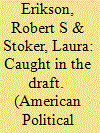

|
|
|
|
|
| Publication |
2011.
|
| Summary/Abstract |
The 1969 Vietnam draft lottery assigned numbers to birth dates in order to determine which young men would be called to fight in Vietnam. We exploit this natural experiment to examine how draft vulnerability influenced political attitudes. Data are from the Political Socialization Panel Study, which surveyed high school seniors from the class of 1965 before and after the national draft lottery was instituted. Males holding low lottery numbers became more antiwar, more liberal, and more Democratic in their voting compared to those whose high numbers protected them from the draft. They were also more likely than those with safe numbers to abandon the party identification that they had held as teenagers. Trace effects are found in reinterviews from the 1990s. Draft number effects exceed those for preadult party identification and are not mediated by military service. The results show how profoundly political attitudes can be transformed when public policies directly affect citizens' lives.
|
|
|
|
|
|
|
|
|
|
|
|
|
|
|
|
| 3 |
ID:
157712
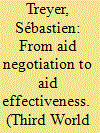

|
|
|
|
|
| Summary/Abstract |
This paper looks at aid ownership through the lens of negotiations that take place between a country and its development partners (DPs). Based on the case of Ethiopian food security policies, it combines a structural analysis of the negotiation capital of both parties with an actor-oriented analysis of the institutional setting through which negotiations take place. First, it shows that the growing influence donors have come to have in the shaping of Ethiopian public policies results from the relative loss of legitimacy the government has experienced after the 2005 political crisis and its greater need for external economic assistance. Second, the more recent creation of a negotiation platform between the Government of Ethiopia (GoE) and its DPs has allowed the GoE to enhance donor’s alignment with its development policies and regain some control over its development agenda, while giving them more room to contribute to several food and nutrition security policy reforms which have been positively evaluated. The paper stresses the need for donors to better recognise the centrality of politics in any aid intervention.
|
|
|
|
|
|
|
|
|
|
|
|
|
|
|
|
| 4 |
ID:
126855
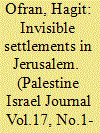

|
|
|
|
|
| Publication |
2011.
|
| Summary/Abstract |
When we talk about Israeli settlement activity in East Jerusalem, we usually mean an activity of one of two types: the large neighborhoods initiated after 1967 by the Israeli government and built on land unilaterally annexed to Jerusalem and expropriated for public needs - i.e., Ramot, Gilo, Pisgat Ze'ev, Har Homa and French Hill. These neighborhoods were set up so that Jewish settlements would encircle East Jerusalem, thus isolating it and separating it from the West Bank, so that East Jerusalem could not serve as the capital of a future Palestinian state. Starting in 1967, successive Israeli governments have undertaken the planning and construction of some 50,000 residential units in these neighborhoods and, today, more than 190,000 Israelis live in them.
|
|
|
|
|
|
|
|
|
|
|
|
|
|
|
|
| 5 |
ID:
124501
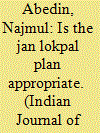

|
|
|
|
|
| Publication |
2012.
|
| Summary/Abstract |
when ombudsman institution was first created in Scandinavia more than 200 years ago its main responsibilities were to redress general or ordinary grievances and complains of citizens against public bureaucracies / administration (not against public representatives) and to protect their rights and liberties against bureaucratic encroachment or maladministration. It was not intended to fight or investigate corruption or to look into the malpractices of the political authorities.
|
|
|
|
|
|
|
|
|
|
|
|
|
|
|
|
| 6 |
ID:
105910
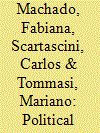

|
|
|
|
|
| Publication |
2011.
|
| Summary/Abstract |
In this article, the authors argue that where institutions are strong, actors are more likely to participate in the political process through institutionalized arenas, while where they are weak, protests and other unconventional means of participation become more appealing. The authors explore this relationship empirically by combining country-level measures of institutional strength with individual-level information on protest participation in seventeen Latin American countries. The authors find evidence that weaker political institutions are associated with a higher propensity to use alternative means for expressing preferences, that is, to protest.
|
|
|
|
|
|
|
|
|
|
|
|
|
|
|
|
| 7 |
ID:
128276
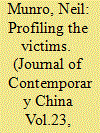

|
|
|
|
|
| Publication |
2014.
|
| Summary/Abstract |
This article aims to identify factors which influence public awareness of health or economic harm from pollution in China. Based on an analysis of the China General Social Survey (CGSS) carried out nationwide by Renmin University and HKUST in 2006, it focuses on self-identification as a pollution victim. The analysis tests three groups of hypotheses about how self-identified victims differ from others: first, in terms of the environmental conditions they experience, such as the actual level of pollution and types of neighbourhoods they inhabit; second, in terms of resources, including material and information resources, time, social capital and political experience; and third, in terms of political attitudes. The conclusion discusses implications for the politics of public participation in environmental governance in China.
|
|
|
|
|
|
|
|
|
|
|
|
|
|
|
|
| 8 |
ID:
124500
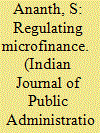

|
|
|
|
|
| Publication |
2012.
|
| Summary/Abstract |
Traditionally microfinance related activities ware provided by non governmental organizations. The success of initial support to self help groups convinced a number of people that lending on the basis of social reference to the poor was a profitable business proposition. This was proved by an enabling environment and government support to NGOs exponentially particularly, in Andhra Pradesh.
|
|
|
|
|
|
|
|
|
|
|
|
|
|
|
|
| 9 |
ID:
130949
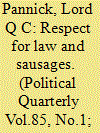

|
|
|
|
|
| Publication |
2014.
|
| Summary/Abstract |
The Parliamentary debates on the clause which became section 31 of the Growth and Enterprise Act 2013 (allowing employees to agree to sign away employment rights for shares in the employing company) show that scrutiny by the House of Commons is very poor, and that scrutiny by the House of Lords is intense and very well-informed. If the Government loses the argument on a Bill in the House of Lords, it will lose the vote. However, during Parliamentary ping-pong (the back-and-forth process of amendment of a Bill between the two Houses) the Commons, and the Government, will normally get their way, however weak the policy proposal, provided that concessions on detail are made, unless the issue is regarded by the Lords as one of fundamental principle.
|
|
|
|
|
|
|
|
|
|
|
|
|
|
|
|
| 10 |
ID:
121048
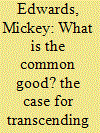

|
|
|
|
|
| Publication |
2013.
|
| Summary/Abstract |
Even if most of us can agree on a definition of the "common good" (not a simple matter), there are substantial barriers to establishing public policies in accord with that agreement. The "democratic" element in our political system - the right of voters to choose the men and women who will create our laws - depends on the views of those voters being given considerable weight in determining eventual policy outcomes. Unfortunately, we have developed a political system - both in our elections and in the governing process - that gives disproportionate influence to relatively small numbers of voters (who are also the most partisan) and allows political parties through their closed procedures to limit the choices available to general election voters. Coupled with legislative rules that allow partisans to determine the makeup of legislative committees, the resulting process leaves the common good, however defined, a secondary consideration at best.
|
|
|
|
|
|
|
|
|
|
|
|
|
|
|
|
|
|
|
|
|